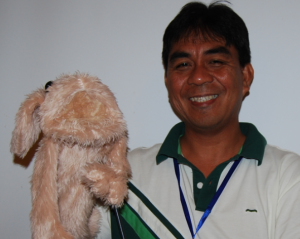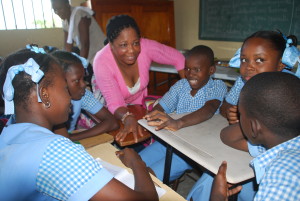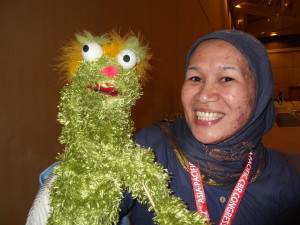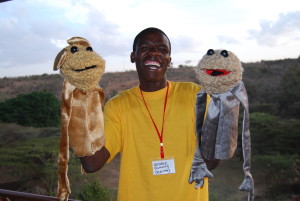WHAT PEOPLE ARE SAYING ABOUT NO STRINGS PRODUCTIONS
AND NO STRINGS UK WORKSHOPS:
Title

Ferdinand Pascual, Division Supervisor, Rizal, Department of Education, Philippines:
“The driving force is we don’t want repeated catastrophes like the one we experienced with Typhoon Ondoy in 2009. We want to educate our pupils so they are aware, not just of the effects of disasters, but how to prepare and be safe. I think The Tales of Disasters is an excellent way of making children safer. It is better for our students to understand these concepts in a lighter way. The children enjoy it very much, and I think it really goes in. One of the things we’re most impressed with is how much they share with their parents. Dodong (Badu), the main character of the films, is a household name here.”

Various future Trainers and Facilitators, CRS staff, Haiti
“The first time I watched The Magic Heart, I was fighting not to cry. I was so traumatized by the earthquake that for a long time, even the sound of a table moving would terrify me. But when the Doll was talking in “ The Magic Heart”, I felt that I was coming out from under the bed like Antoinette. The story has such a positive message, and even though it brought back difficult feelings, in the end I felt strongly that it helped me face my feelings more positively. I believe it will be such a useful tool to use with children of a wide range of ages.”
“If you have suffered loss, it doesn’t matter if you are a teenager or an adult, in many ways you feel like a child deep inside. The Magic Heart story can help anyone to think about their feelings and talk about them, which is a powerful step towards healing.”
“We learn through play. A puppet can put children at ease, either in a group or one-to-one. While they are playing with the puppet, you can encourage children to talk about important things, like what they can do to feel better, and the magic inside them, the underlying theme of all the series for Haiti.”

Mohammad Arif, Deputy Director, OMAR (Organization for Mine Clearance and Afghan Rehabilitation), Kabul, Afghanistan:
“ChucheQhalin“ is an adventure that teaches children where it’s safe to walk and play in our country, where so many landmines threaten their lives and safety. Its characters are based on Afghan folklore, and it’s very popular here. Children watch and don’t even realize it’s really educational, though afterwards, they remember the messages vividly. It’s a much more interesting and therefore effective way for children to learn than to present messages through pictures or long talks. We use it a lot, both in outreach work, and on our media stations, and continue to reach thousands of children on an ongoing basis.”

Ling Ling Matian, Panday Kalinaw Peace-Building Initiatives, Mindanao, Philippines:
“Though Two Gardens was designed for children, we also target the adults. Incredibly, we get a very positive response from them. They get the message loud and clear without being offended because puppetry as a tool is nonthreatening. We go to Christian and Muslim schools, especially where children are directly affected and traumatized by the conflict in their communities, and where prejudices have been implanted in their minds. Discussing the production helps children arrive at more positive values, and slowly instills in them the culture of peace. We have trained more than 100 facilitators to use the production with puppetry, and we receive many, many invitations to do more. Younger children respond very warmly to our hand puppets. For some who have seen much violence, the puppets become friends they rely on. Now I tell people I’m a puppeteer.”
Naw Romana Soe Soe, Karuna Myanmar Social Services, Myanmar:
“Children enjoy the Tales of Disasters in our country, and there is a lot of demand from organizations to use them. Translated into local languages, the productions are easy for them to understand. We use hand puppetry with children after showing the production, which they love. They all want to touch and kiss them. It helps them relax and ask important questions about the key messages.”

Sister Maureen Carroll, FMSA (Franciscan Missionary Sisters for Africa), Mbikko Integrated Development Programme, Uganda:
“The No Strings Kibing! productions are so useful for us at every stage of our HIV educational program. Until now, we have relied on charts, but these stories bring everything to life so vividly. They are very engaging for the younger pupils, while for older ones they have a wonderful additional depth which leads to very important and focused discussion.”





